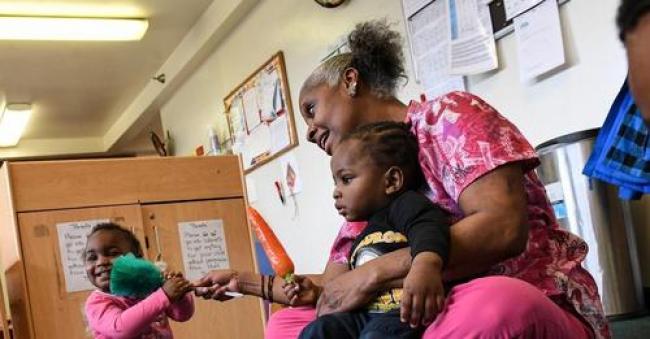Articles Menu

May 2, 2022
With millions of parents across the U.S. forced to leave the workforce due to an inability to find affordable child care during the coronavirus pandemic, families making up to $111,000 per year in New Mexico are set to benefit from a pilot program that went into effect May 1 waiving all child care payments for more than a year.
"This makes New Mexico the first state to offer no-cost care to such a broad range of incomes."
Families earning up to 400% of the federal poverty level are now eligible for the state's child care assistance program. With the median household income standing at just over $51,000, the expansion of the program "will help A LOT of families," said Washington Post reporter Casey Parks.
The state is also eliminating child care copays for middle class families who benefit from subsidies, making child care free for 30,000 households across the state—the broadest swath of a state population to benefit from a free child care program, according to officials.
"This makes New Mexico the first state to offer no-cost care to such a broad range of incomes," said the New Mexico Center on Law and Poverty, which sued the state in 2018 alleging officials arbitrarily denied families access to child care assistance. "This is great for families and workers!"
Advocates credited organizations like OLÉ, a coalition of parents and care providers which also joined the 2018 lawsuit, with pushing for years for better policies for families in the state.
"Let's be clear: this didn't happen by accident," said grassroots group Community Change. "Parents, providers, and advocates never backed down."
The state is drawing from its Early Childhood Education and Care Fund to run the pilot program. The fund, which Grisham established in 2020, draws on taxes from oil and natural gas production.
The governor hopes to use the state's Land Grant Permanent Fund to finance universal no-cost child care after the pilot program ends in June 2023.
"We can and will be first in the country to achieve this incredible goal," Grisham said last week.
The state is also spending $10 million from the American Rescue Plan (ARP) to increase its supply of child care centers. According to a 2018 analysis by the Center for American Progress, 53% of New Mexico residents live in "child care deserts."
New Mexico is strengthening its investment in child care as families across the U.S. grapple with the loss earlier this year of the expanded Child Tax Credit, which sent monthly per-child payments to 36 million families for the last six months of 2021 but was eliminated after Sen. Joe Manchin (D-W.Va.) joined the Republican Party in opposing its continuation.
Provisions in the Build Back Better Act including universal free pre-kindergarten for all three- and four-year-olds and subsidies that would ensure no family pays more than 7% of their income on child care are also languishing in the Senate.
"We need federal dollars to make this happen everywhere in this country," said Dorian Warren, co-president of Community Change, of New Mexico's program.
Households nationwide are also facing higher prices for gas, groceries, and other essentials as companies rake in record profits and reward their shareholders instead of raising wages or lessening the burden on consumers.
The expansion of no-cost child care is "such an important step forward for New Mexico, and it comes at a time when families are in real need of any economic relief," Amber Wallin, executive director of New Mexico Voices for Children, told the Post last week.
New Mexico's program began as child care providers and parents prepare for a national day of action next week called "A Day Without Child Care," in which advocates will call for "a caring economy that values early education and care providers."
On May 9, organizers are calling on the public to join them in demanding:
Since negotiations over the Build Back Better Act stalled in the Senate, progressives have ramped up their calls for policies that would invest in families' wellbeing including universal child care—paid for with a tax on the wealthiest Americans' assets.
Last month, Rep. Jamaal Bowman (D-N.Y.) introduced the Babies Over Billionaires Act to tax the unrealized capital gains of the top 0.01% of taxpayers with over $100 million in assets.
"Finally, maybe we could have paid family leave," Bowman said last week. "Finally, maybe we could have universal child care. Finally, maybe we could have universal pre-K, and all of the things that we need to secure a healthy, thriving democracy and society for everyone."
[Top photo: Childcare worker Debbie James-Dean sits with children at a Kids Are Us Learning Center in Southeast Washington, D.C., on March 24, 2017. In New Mexico, families earning up to $111,000 per year are now eligible for a pilot program providing free child care. (Photo: Toni L. Sandys/The Washington Post via Getty Images)]